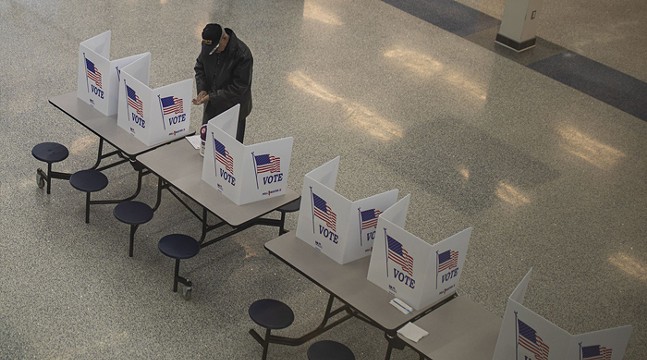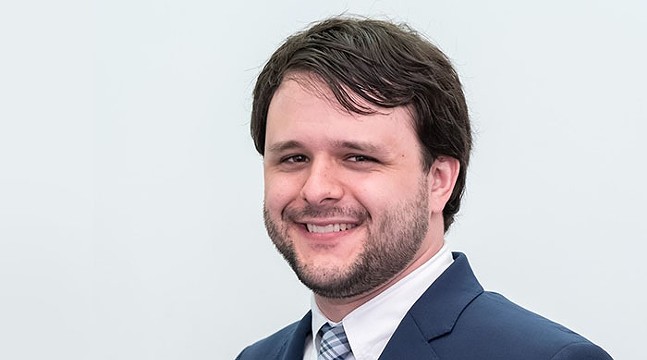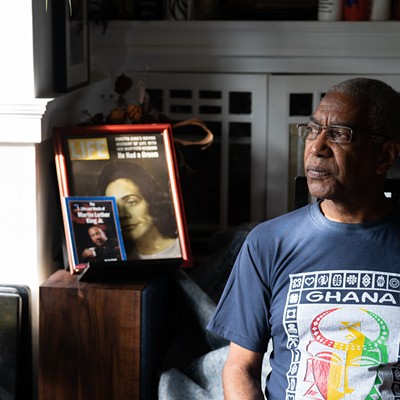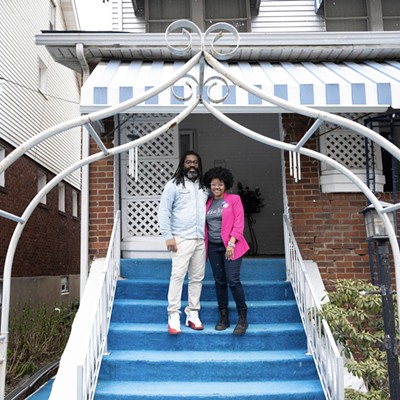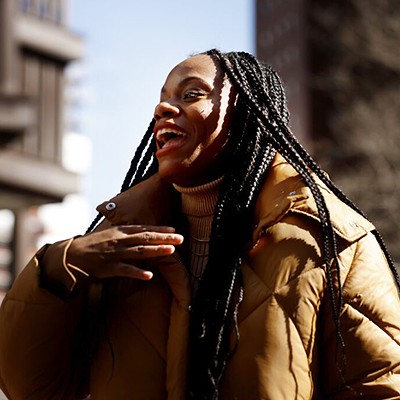On Nov. 7, Greater Pittsburgh, like the rest of the country, will head to the polls. The region's patchwork of numerous small municipalities, school districts, and magisterial courts means that residents living blocks apart may have very different ballots. Some of these races may not seem glamorous, but candidates and elected officials agree that voting in these local contests has a major bearing on local policy.
Allegheny County Councilor Tom Duerr, who serves on the county board of elections and has worked on several Democratic campaigns, encourages locals to pay attention to these races.
"I see firsthand the impact that this local of an office can have," Duerr tells Pittsburgh City Paper. Municipal elected officials "will have far more impact on your everyday life than any position in Harrisburg or D.C." Not only do politicians at the local level address needs including trash collection, public transport, and infrastructure upkeep, Duerr says, but they're much more accessible than state and national figures.
"Even if it's just keeping the roads paved or keeping them clear in winter, that's all local government," he notes. "It doesn't matter who's Speaker of the House if you can't get to the grocery store."
Changing demographics, higher turnout, and more candidates running for office mean 2023 is a year with a lot of options. For voters hoping for change, this could be the year new officeholders make long-hoped-for policies a reality — that's true for voters on both sides of the rift between Democrats and Republicans. Progressives have a chance to entrench liberal policies, including a reassessment of local property tax rates. Conservatives, meanwhile, hope to reshape area school boards and put a stop to what they view as progressive overreach.
Regardless of local party affiliation, local municipalities — some of them rocked by recent scandals — have an opportunity for a changing of the guard.
Municipal clashes
Duerr says residents of Allegheny County's 130 municipalities have plenty of those opportunities this election cycle. Party parity and energized electorates portend change in South Hills suburbs Bethel Park (where Duerr lives) and Upper St. Clair, as well as North Hills suburbs including Ross Township and Franklin Park."In Bethel Park, every municipal race is contested," he tells City Paper. Three council members are retiring, leaving four races open for both Democratic and Republican challengers. Duerr views Bethel Park and Shaler as "the two biggest bellwethers" for the region's political trends.
While Pittsburgh's exurbs remain largely conservative, areas including the fast-growing northern edge of Allegheny County and southerly streetcar suburbs such as Mt. Lebanon seem to be growing more progressive with each election cycle. Upper St. Clair, Duerr says, is another example of a fast-changing suburb.
"Upper St. Clair is one of the fastest-trending Democratic areas in the county, but the municipal government has not caught up with that yet," Duerr says. "This could be the year that starts to break."
In some municipalities, scandal and internecine conflict are making for a lively election cycle. In one instance, South Fayette Township commissioners drew local ire for going on a $10,000 "strategic planning retreat" at taxpayers' expense and then limiting opportunities for open comment during commission meetings. May's primary saw around 70% of all voters turn out in the township to oust the incumbent commissioners who took the trip. Four Democrats and two Republicans are now vying for the seats — Duerr estimates that Democrats have a razor-thin edge in the township, so how the commission will look in 2024 is anyone's guess.
Other jurisdictions have seen similar controversies. In more reliably liberal Bellevue, a controversial plan to decertify the borough's volunteer fire department raised locals' hackles. Borough council vice president Amanda Sloane has since drawn a Republican challenger.
Using data from the past decade of elections, Duerr has ranked municipal elections by competitiveness. In addition to Upper St. Clair, Bethel Park, and Bridgeville, Duerr anticipates close races in McCandless, Ross, Franklin Park, and Robinson.
Many of these municipalities also have multiple candidates of both parties vying for school board seats.
School board scuffles
Nothing has gotten Americans off the fence and into the political fray like school board elections. In places like Pine-Richland School District, a combination of COVID restrictions and the firing of a popular coach paved the way for a conservative board takeover in 2021. Two years and an influx of new residents later, a slate of liberal candidates is hoping to reverse conservative gains, which have resulted in policy changes some parents of BIPOC and LGBTQ young people find objectionable.Pittsburgh educator Russell Patterson, who lives in Pine-Richland, says COVID has turned up the heat in local school board contests — he's running to restore a measure of cooperative spirit to the board.
"I believe school boards should reflect an array of voices and perspectives," Patterson tells CP. "When they operate as a cohesive team, they can have a massive impact on the children in our community."
Along with Patterson, Gehua "Gary" Yang, Ashley Fortier, and Jen Beuse are running on the liberal-leaning Together for PR ticket. Beuse feels that "everyone should pay attention to school board elections because the success of schools is one of the leading factors for many when deciding which community to join or leave."
On the other side of the issue, Pine-Richland Kids First (PRKF) has pushed back on what they perceive as a focus on social justice initiatives and poorly planned COVID mitigation strategies. This group of right-wing candidates includes Mike Wiethorn, who was instrumental in pushing for a policy that would compel transgender students to use the bathroom corresponding to their sex at birth. (PRKF did not respond to CP's requests for comment by press time.)
In Pittsburgh itself, veteran educator Ron Sofo contested the school board seat currently held by Devon Taliaferro in May's primary.
"Too many parents of economic means of all races have opted out of our city public schools," Sofo tells CP. "Approximately 60% of students who live in Pittsburgh do not attend PPS-operated schools." Sofo says increased spending has not increased the quality of local schools — he says local school directors need to "rethink" their approach.
Sofo, a Democrat, positioned himself as a pragmatist running to Taliaferro's right (Taliaferro did not respond to a request for comment). "I see the progressive wing of the Democratic party as being out of touch with real, practical, nuanced solutions to the challenges that face us," Sofo says. Like Taliaferro, he wants more teachers of color in city schools and deplores the way charter schools have hurt enrollment, but he says the current board and administration of PPS aren't transparent and don't seem motivated to fix the district's many pressing issues despite its $900 million budget.
"We must look at ourselves as both the root cause of the mess we are in and as the source for the best solutions," he says of Pittsburgh educators. He hopes "tangible progress" will encourage more voters to head to the polls and push for change.
Politics by post
A positive sign for anyone interested in local politics is that turnout has been up in recent years. Though odd-numbered years still lag far behind even-numbered ones, when national elections drive turnout above 50%, more voters have been making their voices heard. In 2017, turnout sat at an anemic 23.6%, but that number rose to 28.9% in 2019 and 33.4% in 2021.Duerr says this is due to several different factors, but one of the big game-changers has been the introduction of vote by mail. "We have more easy ways to vote in Pennsylvania than ever," he says.
In addition to allowing voters to cast their ballot at their convenience, Duerr says it gives voters time to research candidates and make more informed decisions, especially in down-ballot races. He expects participation to continue to rise before plateauing as voters "form a habit" of casting ballots by mail every year. He says he's hopeful Gov. Josh Shapiro's support for automated voter registration at area DMVs could prove beneficial to turnout in years when national politics aren't on the ballot. Duerr has also noticed a positive impact from better-organized campaigns.
Pine-Richland candidate Yang is emphatic that these off-years matter. He says school directors and other local officials can have a major impact on policy.
"While their decisions do not carry as much weight as the ones from the state or the federal level, the effect is usually long-lasting," Yang tells CP. "Local elections are a great opportunity for voters to get their voices heard and to pick the candidates who share the same vision."
Correction: An earlier version of this article portrayed Ron Sofo as a current candidate. Sofo ran in the Democratic primary. The error has been corrected.

